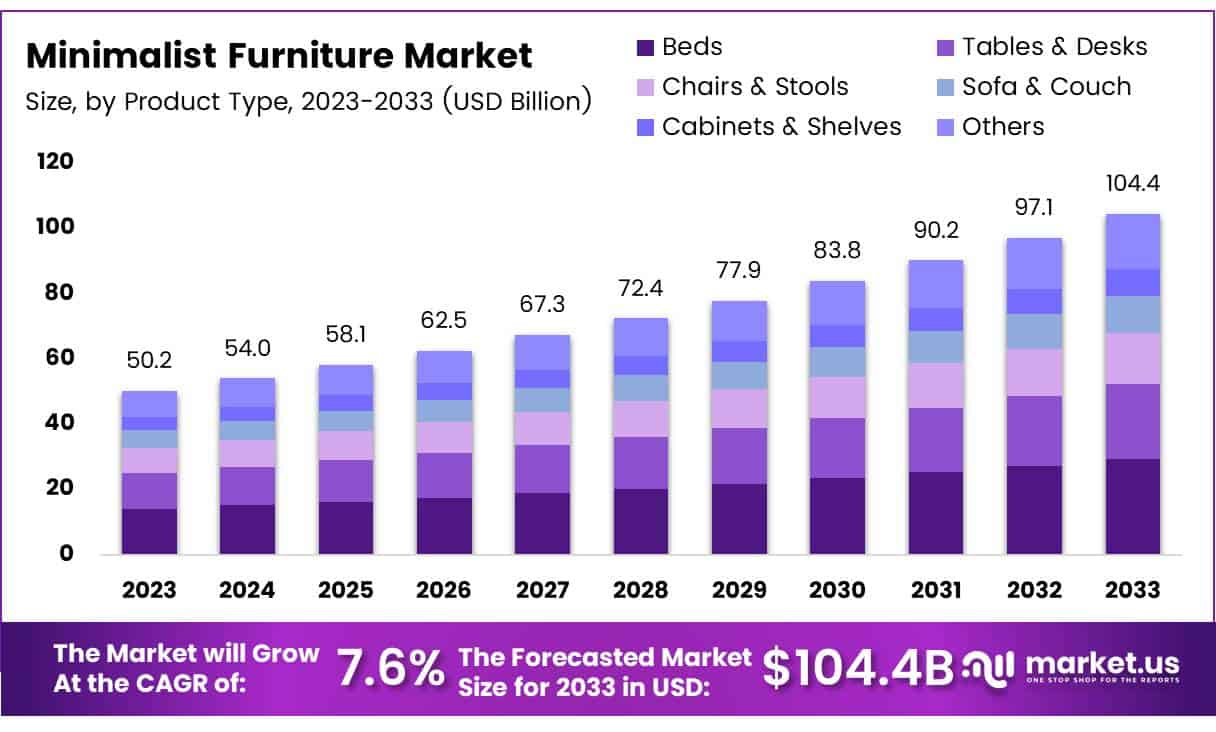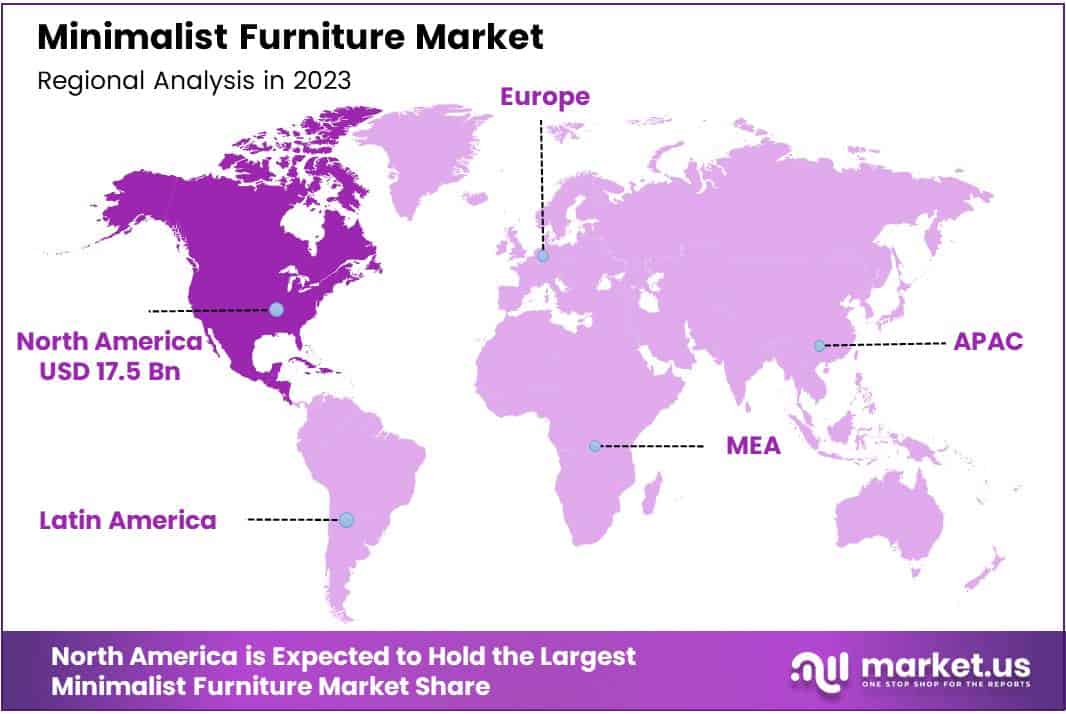Table of Contents
Introduction
Impact of U.S. Tariffs on The Global Minimalist Furniture Market is projected to reach approximately USD 104.4 billion by 2033, rising from an estimated USD 50.2 billion in 2023. This growth is anticipated to occur at a compound annual growth rate (CAGR) of 7.6% during the forecast period from 2024 to 2033.
Minimalist furniture refers to design-focused pieces characterized by simplicity, clean lines, functional form, and a lack of excessive ornamentation. Typically defined by neutral colors, space-saving utility, and a focus on essentialism, minimalist furniture aligns with modern interior aesthetics and lifestyle shifts toward decluttering and sustainability. The minimalist furniture market comprises manufacturers, designers, and retailers involved in the production and distribution of such furnishings across residential, commercial, and institutional sectors. Growth of the minimalist furniture market is being driven by the increasing consumer preference for modern, space-efficient living solutions, particularly in urban areas where compact apartments are prevalent.
The rising influence of minimalism as a lifestyle supported by digital media, interior design trends, and popular culture is further bolstering demand for sleek and functional furniture. Moreover, heightened awareness of sustainable consumption patterns is compelling consumers to invest in long-lasting, multifunctional, and eco-conscious furniture products, positively impacting market dynamics. The demand for minimalist furniture is also being fueled by rapid urbanization, increasing disposable incomes, and the growth of e-commerce platforms that enable access to a wide variety of minimalist designs globally.
Additionally, evolving work-from-home trends have increased the focus on ergonomic and clutter-free furniture solutions, strengthening demand across home office settings. A key market opportunity lies in the integration of minimalist aesthetics with smart furniture technologies and sustainable materials, catering to eco-conscious and tech-savvy consumers. As sustainability becomes a competitive differentiator, companies that innovate in terms of materials, modularity, and design customization stand to gain a considerable advantage in this evolving and design-centric market landscape.

Key Takeaways
- The global minimalist furniture market is projected to witness significant growth, expanding from USD 50.2 billion in 2023 to USD 104.4 billion by 2033, registering a Compound Annual Growth Rate (CAGR) of 7.6%.
- Among product categories, beds emerged as the dominant segment, holding a 31% share in 2023. The popularity of minimalist beds is driven by their practical design, multifunctionality, and compatibility with modern interior aesthetics.
- Wood accounted for the largest material share at 40% in 2023, underpinned by its sustainability, aesthetic appeal, and adaptability to various design formats.
- The residential sector captured 62% of the total market share in 2023, indicating a high demand for minimalist furniture in homes.
- North America emerged as the leading regional market, accounting for 35.5% of the global market share, with a valuation of USD 17.5 billion in 2023.
Request A Sample Copy Of This Report at https://market.us/report/minimalist-furniture-market/request-sample/
Report Scope
| Report Features | Description |
|---|---|
| Market Value (2023) | USD 50.2 billion |
| Forecast Revenue (2033) | USD 104.4 billion |
| CAGR (2024-2033) | 7.6% |
| Segments Covered | Inter IKEA Systems B.V., MillerKnoll, Williams Sonoma, Inc., VITRA INTERNATIONAL AG, Blu Dot Design & Manufacturing, Inc., Umbra, Acanva Co., Muji, BoConcept, Floyd Home |
| Competitive Landscape | By Product Type (Beds, Tables and Desks, Chairs and Stools, Sofa and Couch, Cabinets and Shelves, Others), By Material (Wood, Metal, Glass, Plastic, Others), By Application (Residential, Commercial) |
Emerging Trends
- Integration of Natural Materials: Designers are increasingly incorporating materials like stone and wood into minimalist furniture, moving away from stark whites to warmer, textured designs.
- Emphasis on Craftsmanship: There is a growing preference for furniture items that showcase character and craftsmanship, with consumers favoring locally made goods over mass-produced pieces.
- Decluttering and Smart Storage Solutions: Minimalist design continues to prioritize decluttered spaces, leading to an increased demand for furniture that offers smart storage solutions to maintain organized environments.
- Preference for High-Quality Materials: Consumers are shifting towards purchasing furniture made from higher-quality materials, valuing durability and longevity over disposable items.
- Reduction of Unnecessary Decorative Pieces: The minimalist ethos is extending to home accessories, with a focus on simplicity and the elimination of superfluous decorative items, emphasizing functional and meaningful pieces.
Top Use Cases
- Urban Residential Spaces: In densely populated urban areas, minimalist furniture is favored for its space-saving designs, catering to smaller living environments.
- Commercial Office Environments: Businesses are adopting minimalist furniture to create clean, organized workspaces that promote productivity and reflect modern aesthetics.
- Hospitality Industry: Hotels and resorts are integrating minimalist designs to offer guests serene and uncluttered environments, enhancing the overall experience.
- Retail Spaces: Minimalist furniture is utilized in retail settings to create open and inviting spaces that highlight products without distraction.
- Educational Institutions: Schools and universities are incorporating minimalist furniture to foster focused learning environments and efficient use of space.
Major Challenges
- Consumer Perception: Some consumers associate minimalist furniture with a lack of warmth or personality, potentially limiting its appeal to certain demographics.
- Cost of High-Quality Materials: The use of premium materials in minimalist furniture can lead to higher costs, making it less accessible to budget-conscious consumers.
- Limited Customization Options: Minimalist designs often offer fewer customization choices, which may not meet the diverse preferences of all consumers.
- Market Saturation: As minimalist furniture gains popularity, the market faces increased competition, making it challenging for brands to differentiate themselves.
- Supply Chain Constraints: Sourcing sustainable and high-quality materials can be hindered by supply chain disruptions, affecting production timelines and costs.
Top Opportunities
- Expansion in Emerging Markets: Rapid urbanization in regions like Asia-Pacific presents opportunities for minimalist furniture brands to cater to new consumer bases seeking space-efficient solutions.
- Sustainable Product Lines: Developing furniture using eco-friendly materials can attract environmentally conscious consumers and align with global sustainability trends.
- E-commerce Growth: The rise of online shopping platforms allows minimalist furniture brands to reach a broader audience and offer convenient purchasing options.
- Integration of Technology: Incorporating smart features into minimalist furniture, such as built-in charging ports or adjustable components, can enhance functionality and appeal.
- Collaborations with Designers: Partnering with renowned designers can result in unique collections that blend minimalist aesthetics with innovative concepts, attracting design-savvy consumers.
Key Player Analysis
The global minimalist furniture market in 2024 is characterized by the strategic positioning and design innovation of key players such as Inter IKEA Systems B.V., MillerKnoll, and Williams Sonoma, Inc., who continue to influence the competitive landscape. Inter IKEA Systems B.V. remains a dominant force due to its extensive global reach, modular product offerings, and cost-efficient supply chain strategies, which align with rising demand for functional, space-saving furniture.
MillerKnoll leverages its legacy in ergonomic design and premium aesthetics to target the upscale minimalist segment, while Williams Sonoma, Inc., through its West Elm and Pottery Barn brands, integrates sustainable practices with sleek, contemporary designs to appeal to eco-conscious consumers.
VITRA INTERNATIONAL AG and Blu Dot Design & Manufacturing, Inc. emphasize design-centric portfolios with a strong European and North American market focus, respectively. Muji and Umbra prioritize affordability and compact design, aligning with urban dwellers’ needs. Meanwhile, BoConcept, Floyd Home, and Acanva Co. strengthen the market through customization, direct-to-consumer models, and enhanced online retail experiences.
Key Players in the Market
- Inter IKEA Systems B.V.
- MillerKnoll
- Williams Sonoma, Inc.
- VITRA INTERNATIONAL AG
- Blu Dot Design & Manufacturing, Inc.
- Umbra
- Acanva Co.
- Muji
- BoConcept
- Floyd Home
Purchase The Full Report Now at https://market.us/purchase-report/?report_id=136208
Regional Analysis
North America Leads Minimalist Furniture Market with Largest Market Share of 35.5%
North America emerged as the leading region in the global minimalist furniture market, accounting for the largest market share of 35.5% in 2024, with an estimated market value of USD 17.5 billion. The growth in this region is primarily attributed to high consumer spending on home décor, a strong inclination toward modern and space-efficient interiors, and the rising adoption of Scandinavian and Japanese-inspired furniture designs. The U.S. continues to play a dominant role in regional growth, driven by increasing urban apartment living, a robust e-commerce distribution network, and growing consumer demand for functional yet aesthetic home furnishings.
The minimalist furniture trend in North America is further supported by the presence of prominent market players and innovative product offerings tailored for compact living spaces. Moreover, sustainable and eco-conscious furniture choices are gaining traction among U.S. consumers, aligning with broader environmental values and lifestyle shifts.
However, trade policies such as U.S. tariffs on imported furniture, especially from Asia-Pacific countries like China and Vietnam, have impacted pricing dynamics across the market. These tariffs have increased costs for manufacturers and retailers, leading to price volatility and pushing several domestic players to reconsider supply chain strategies or increase local production to mitigate margin pressures. Despite these trade headwinds, the region is projected to maintain its leadership position due to stable housing market trends, high purchasing power, and evolving consumer preferences toward minimalist living environments.

Recent Developments
- In 2025, Jil Sander collaborates with Thonet to enhance Marcel Breuer’s cantilevered S 64 chair. The fashion designer unveiled the JS Thonet collection during Milan Design Week, showcasing innovative versions of the iconic chair, alongside a modernized design of the B 97 side table.
- In 2025, Wooden Street, a prominent furniture and home décor brand, secured 34 million euros in Series C funding from Premji Invest. Established in 2015, the company operates over 100 experience centres and follows a vertically integrated model, offering high-quality products at competitive prices through in-house manufacturing.
- In 2023, Cityfurnish, a furniture rental startup, raised 2.5 million USD in a funding round. The company, which has now raised a total of 10 million USD in debt and equity, aims to revolutionize the home furnishing experience by offering flexible and hassle-free rental solutions.
- In 2023, Mjuk, a Finnish furniture re-commerce shop, raised 2.5 million euros in funding. Backed by Trind VC, Alliance VC, Superhero Capital, Lifeline Ventures, and angel investors, the funds will help Mjuk reduce waste and expand its market presence, both in B2B and B2C segments.
Conclusion
The global minimalist furniture market is experiencing robust growth, propelled by increasing urbanization, a rising preference for functional and space-saving designs, and heightened environmental consciousness among consumers. The demand for minimalist furniture is further supported by the expansion of e-commerce platforms, enabling broader accessibility and customization options. As the industry continues to evolve, manufacturers are focusing on integrating smart technologies and sustainable materials to meet the changing needs of modern consumers. This trend underscores the market’s potential for sustained expansion in the coming years.
Discuss your needs with our analyst
Please share your requirements with more details so our analyst can check if they can solve your problem(s)





